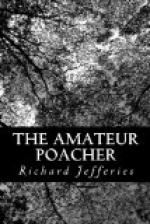It is the sweetest time of all for wandering in the wood. The brambles have not yet grown so bushy as to check the passage; the thistles that in autumn will be as tall as the shoulder and thick as a walking-stick are as yet no bar; burrs do not attach themselves at every step, though the broad burdock leaves are spreading wide. In its full development the burdock is almost a shrub rather than a plant, with a woody stem an inch or more in diameter.
Up in the fir trees the nests of the pigeons are sometimes so big that it appears as if they must use the same year after year, adding fresh twigs, else they could hardly attain such bulk. Those in the ash-poles are not nearly so large. In the open drives blue cartridge-cases lie among the grass, the brass part tarnished by the rain, thrown hurriedly aside from the smoking breech last autumn. But the guns are silent in the racks, though the keeper still carries his gun to shoot the vermin, which are extremely busy at this season. Vermin, however, do not quite agree among themselves: weasels and stoats are deadly enemies of mice and rats. Where rats are plentiful there they are sure to come; they will follow a rat into a dwelling-house.
Here the green drive shows traces of the poaching it received from the thick-planted hoofs of the hunt when the leaves were off and the blast of the horn sounded fitfully as the gale carried the sound away. The vixen is now at peace, though perhaps it would scarcely be safe to wander too near the close-shaven mead where the keeper is occupied more and more every day with his pheasant-hatching. And far down on the lonely outlying farms, where even in fox-hunting England the music of the hounds is hardly heard in three years (because no great coverts cause the run to take that way), foul murder is sometimes done on Reynard or his family. A hedge-cutter marks the sleeping-place in the withies where the fox curls up by day; and with his rusty gun, that sometimes slaughters a roaming pheasant, sends the shot through the red side of the slumbering animal. Then, thrust ignobly into a sack, he shoulders the fox and marches round from door to door, tumbling the limp body rudely down on the pitching stones to prove that the fowls will now be safe, and to be rewarded with beer and small coin. A dead fox is profit to him for a fortnight. These evil deeds of course are cloaked as far as possible.
Leaving now the wood for the lane that wanders through the meadows, a mower comes sidling up, and, looking mysteriously around with his hand behind under his coat, ‘You med have un for sixpence,’ he says, and produces a partridge into whose body the point of the scythe ran as she sat on her nest in the grass, and whose struggles were ended by a blow from the rubber or whetstone flung at her head. He has got the eggs somewhere hidden under a swathe.




